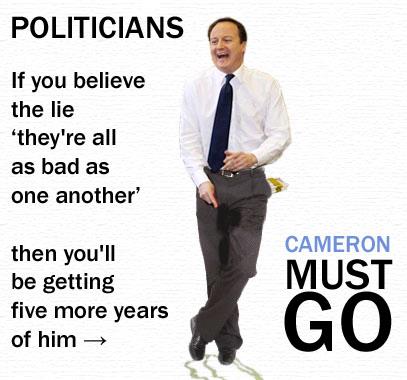
Dr. Lawrence Britt examined the fascist regimes of Hitler (Germany), Mussolini (Italy), Franco (Spain), Suharto (Indonesia) and several Latin American regimes. Britt found 14 defining characteristics common to each, and it is becoming increasingly difficult to overlook some of the parallels with increasingly authoritarian characteristics of our own right wing government here in the UK.
Controlled mass media is one example of such a defining feature of fascism, with “news” being directly controlled and manipulated by the government, by regulation, or via sympathetic media spokespeople and executives. Censorship is very common. And then there is an obsession with “National Security” – with fear being used as a “motivational tool” by the government on the public.
In June 2013, a visit by Government national security agents to smash computer hard drives at the Guardian newspaper offices hit the news surprisingly quietly, when Edward Snowden exposed a gross abuse of power and revealed mass surveillance programmes by American and British secret policing agencies (NSA and GCHQ) last year. (More detailed information here).
David Miranda, partner of Glenn Greenwald, Guardian interviewer of the whistleblower Edward Snowden, was held for 9 hours at Heathrow Airport and questioned under the Terrorism Act. Officials confiscated electronics equipment including his mobile phone, laptop, camera, memory sticks, DVDs and games consoles.
This was a profound attack on press freedoms and the news gathering process, and as Greenwald said: “To detain my partner for a full nine hours while denying him a lawyer, and then seize large amounts of his possessions, is clearly intended to send a message of intimidation.”
Absolutely. Since when was investigative journalism a crime?
Even the Telegraph columnist Janet Daley remarked that these events were like something out of East Germany in the 1970s.
This certainly raised critically important legal and ethical issues, for those involved in journalism, especially if some kinds of journalism can be so easily placed at risk of being politically conflated with terrorism.
Once again, the mild and left wing/liberal Guardian is under attack by our Tory-led government. In an extraordinary and vicious attack on The Guardian newspaper, Department for Work and Pensions (DWP) communications chief and senior government spin doctor, Richard Caseby, has called for the newspaper to be “blackballed” and prevented from joining the new press regulatory body, because “day after day it gets its facts wrong.” Remarkably, “ineptitude or ideology” were to blame for what he deemed “mistakes” in the paper’s coverage of the DWP’s cuts to benefits. He called for the broadsheet to be kept out of the new Independent Press Standards Organisation (IPSO), set up after the Leveson Inquiry into media standards.
As a former journalist at the Sun and The Sunday Times, Caseby certainly has an axe to grind against the paper that revealed how those right wing papers’ stablemate, the News Of The World, had hacked the voicemail of murdered teenager Millie Dowler, sparking the phone hacking scandal that prompted Rupert Murdoch to close the tabloid down.

Richard Caseby, pictured when giving evidence to MPs as managing editor of The Sun.
In July 2011 it emerged that Cameron met key executives of Murdoch’s News Corporation 26 times during the 14 months that Cameron had served as Prime Minister. It was also reported that Murdoch had given Cameron a personal guarantee that there would be no risk attached to hiring Andy Coulson, the former editor of News of the World, as the Conservative Party’s communication director in 2007. This was in spite of Coulson having resigned as editor over phone hacking by a reporter. Cameron chose to take Murdoch’s advice, despite warnings from Nick Clegg, Lord Ashdown and the Guardian. Coulson resigned his post in 2011 and was later arrested and questioned on allegations of further criminal activity at the News of the World, specifically regarding the News International phone hacking scandal.
The Culture, Media and Sport Committee of the House of Commons served a summons on Murdoch, his son James, and his former CEO Rebekah Brooks to testify before a committee on 19 July. After an initial refusal, the Murdochs confirmed they would attend after the committee issued them a summons to Parliament. The day before the committee, the website of the News Corporation publication the Sun was “hacked”, and a false story was posted on the front page claiming that Murdoch had died. Murdoch described the day of the committee “the most humble day of my life.” He argued that since he ran a global business of 53,000 employees and that the News of the World was “just 1%” of this, he was not ultimately responsible for what went on at the tabloid.
On 1 May 2012, the Culture, Media and Sport Committee issued a report stating that Murdoch was “not a fit person to exercise the stewardship of a major international company.”
On 3 July 2013 Exaro and Channel 4 news broke the story of a secretly recorded tape. It had been recorded by Sun journalists, and in it Murdoch can be heard telling them that the whole investigation was “one big fuss over nothing”, and that he, or his successors, would “take care” of any journalists who went to prison.
He said: “Why are the police behaving in this way? It’s the biggest inquiry ever, over next to nothing.” Murdoch believes that he doesn’t have to be accountable. His initial refusal to testify, despite being summonsed, is extraordinarily indifferent and arrogant.
In connection with Murdoch’s testimony to the Leveson Inquiry “into the ethics of the British press,” editor of Newsweek International, Tunku Varadarajan, referred to him as “the man whose name is synonymous with unethical newspapers.”
Not a shred of concern raised about any of this or Murdoch’s nasty and corrupt myth industry, and right wing scapegoating empire, coming from our government, a point worth reflecting on for a moment. Miliband said the phone-hacking was not just a media scandal, but it was a symbol of what was wrong with British politics. He called for cross-party agreement on new media ownership laws that would cut Murdoch’s current market share, arguing that he has “too much power over British public life.” He said: “If you want to minimise the abuses of power, then that kind of concentration of power is frankly quite dangerous.”
Meanwhile, Iain Duncan Smith is “monitoring” the BBC for any “left wing bias”. Gosh, I just bet that took the jolly well-known ardent commie Chris Patten by complete surprise…
The BBC Trust said that a programme called the “Future of Welfare”, written and presented by John Humphrys, breached its rules on impartiality and accuracy. It found that the programme had failed to back up with statistics claims that there was a “healthy supply of jobs”.
Iain Duncan Smith, the Work and Pensions Secretary, defended Humphrys as a “robust broadcaster” and said the documentary was “thoughtful and intelligent”. And perhaps most importantly, it endorsed the Governments’ punitive and callous welfare “reforms.”
Duncan Smith was infuriated by the BBC’s coverage of the ruling, which he felt gave “too much airtime to campaigners.” Too much for what, exactly, we have to wonder. Perish the thought that anyone may dare to poke at the half-timbered facade of Tory ideology – Duncan Smiths’ rhetoric is a painful parody of fact that loudly dismisses – and intentionally obscures – the private despair and ruined lives of so many of those least able to speak up for themselves.
He said: “I have just watched reporting on the BBC about the Government winning a High Court judgement on the Spare Room Subsidy (that’s the Bedroom Tax to you and I) that once again has left me absolutely staggered at the blatant Left-wing bias within the coverage. And yet the BBC Trust criticise John Humphrys’s programme, which was thoughtful, intelligent and born out of the “real” life experience of individuals.” The same Duncan Smith, who chooses to deny the all too painful and impoverished real life experiences his policies have inflicted on many. He prefers to lie them away from public attention. Or dismiss them as merely “anecdotal”.
Duncan Smith’s credibility doesn’t stand up to much scrutiny here, as someone attempting to verify “accuracy” and er… statistical claims. Ah, yes. The Department of Work and Pensions – Iain Duncan Smiths’ Department – has a long track record of misusing statistics, making unsubstantiated inferences and stigmatising claimants, and it’s clear these are tactics used to attempt to vindicate further welfare cuts. In fact several minsters, including Cameron, have been officially rebuked by the Office of National Statistics for telling lies, and in Duncan Smith’s case – on at least 3 occasions this past 12 months despite warnings regarding his dishonest claims in the media, as well as in parliament.
So considering all of this, it was with some incredulity that I read Caseby’s comments in the Huff Post earlier: “Should the new IPSO members accept (editor Alan Rusbridger) as a johnny-come-lately? No, rather he should be blackballed. Sorry, but the Guardian isn’t fit to become a member of IPSO until it starts valuing accuracy.”
And: “In the end, of course, it’s IPSO’s decision. But should the new standards body be so gracious as to invite him in, I guess I’ll be waiting to lodge the first complaint.” He said an MP had complained to the Office for National Statistics over The Guardian’s reporting of its data. I bet that was said without a trace of irony, too.
So, if alleged (and improbable) benefits inaccuracies “should get [The] Guardian blackballed,” what is this spin doctor’s recommendation for the perpetual propagandarising, lying, right wing media and a lying government minister’s serial offensive “benefits inaccuracies”?
Oh … of course, this is Iain Duncan Smiths’ relatively new pet guard dog.
An interesting choice of word from Caseby – “blackballing”, which is a rejection in a traditional form of secret ballot, where a white ball ballot constitutes a vote in support and a black ball signifies opposition. This system is typically used where a club (or Lodge) rules provide that, rather than a majority of the votes, one or two objections are sufficient to defeat a proposition. Since the seventeenth century, these rules have commonly applied to elections to membership of many gentlemen’s clubs and similar institutions such as in Freemasonry. It’s an apt term because of its association with conservatism, tradition and secrecy.
In contrast, and unlike many whistleblowers who remain anonymous, Edward Snowden chose to be open and go public. Snowdens’ sole motive for leaking the documents was, in his words, “to inform the public as to that which is done in their name and that which is done against them.” He believes that the global public is due an explanation of the motives of those who act outside of the democratic process.
To “protect democracy” we have governments that are subverting the law. This is a fundamental paradox, of course and Snowden saw this could lead to the collapse of democracy and critically endanger our freedom. And Snowden reminds us that what no individual conscience can change, a free press can. It has to be one that is free enough to allow a diverse range of political commentaries, rather than a stranglehold of right wing propaganda from the Murdoch empire and its ideological stablemates.
I think that the process of dismantling democracy started in May 2010 here in the UK, and has been advancing incrementally ever since, almost undetected at first, because of pervasive government secrecy and a partly complicit, dominant right wing media.
But once you hear the jackboots, it’s far too late.

With big thanks to Robert Livingstone
Related
The Transparency of Lobbying, non-Party Campaigning, and Trade Union Administration Bill is a calculated and partisan move to insulate Tory policies and records from public and political scrutiny, and to stifle democracy. The Government’s Lobbying Bill has been criticised by bloggers and campaigners from right across the political spectrum, with the likes of Owen Jones and Guido Fawkes united in agreement over this issue: that the Bill is a “Gagging Act”. Five Conservatives – Douglas Carswell, Philip Davies, David Davis, Zac Goldsmith and David Nuttall – voted against the Bill, whilst others also expressed concerns.
The Bill will treat charities, think tanks, community groups and activists of every hue as “political parties”. From small groups addressing local matters to big national organisations, all equally risk being silenced in the year before a general election, to avoid falling under electoral law. Any organisation spending £5,000 a year and expressing an opinion on anything remotely political must register with the Electoral Commission. Since most aspects of our public life are political, (and a substantial proportion of our private life has been increasingly politicised under this authoritarian government) this stifles much essential debate in election years when voters should be hearing and evaluating policy choices.
The ‘Let Lynton Lobby Bill’: Grubby Partisan Politics and a Trojan Horse
I don’t make any money from my work. But you can help Politics and Insights if you like by making a donation to help me continue to research and write free, informative, insightful and independent articles, and to provide support to others. The smallest amount is much appreciated – thank you.














